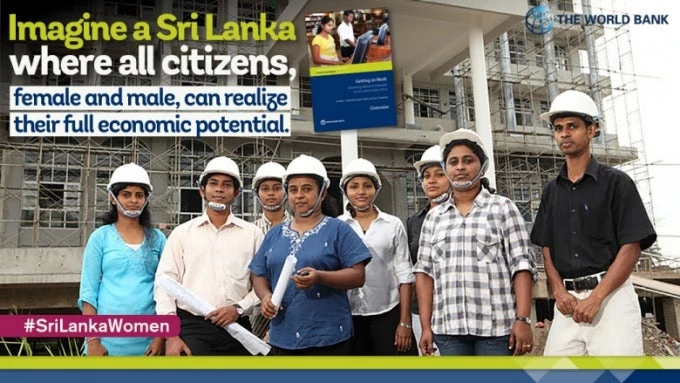
I heard about some of these challenges. One girl had an ailing mother at home and was responsible for her care; another struggled to study on weekends while working on weekdays, with both activities requiring long commutes. One young lady, T. Priya, who had just graduated from university with a BA, told me she was currently unemployed because she was determined to wait for the right job—which to her, meant joining the public sector. You’d be amazed at how often I have heard this from young Sri Lankans. Unfortunately, as we all know too well, there are only a limited number of these positions available.
This week, the World Bank published Getting to Work: Unlocking Women’s Potential in Sri Lanka’s Labor Force. The report notes that the number of women participating in Sri Lanka’s workforce is low, that women under 30 are facing high rates of unemployment and that wage disparities still exist between the sexes.
Among its findings is that women like Priya, despite having high educational attainments (university level or higher), still queue for a limited number of public sector jobs which raises their rates of unemployment. Government jobs are seen as offering more flexible hours and financial security than private sector jobs.
Another issue is that the burden of household responsibilities and chores fall disproportionately on women. When women got married, it made it harder, not easier, for them to go to work, and this was only exacerbated when women had children.
For men, the situation is somewhat different. As of 2015, marriage lowered the odds of Female Labour Force Participation by 4.4 percentage points, while boosting men’s odds by 11 percentage points.
But I think the roots of this problem go deeper, and start early. Young girls learn that it’s not important to be good at maths or sciences and many more pursue degrees in humanities and the arts, widely considered gender appropriate, rather than in the technical skills that are in demand in the private sector and growing industries.
This is only one way in which we limit our daughters.
Later on, worried about issues like their safety while commuting and sexual harassment at work, families want women to take only jobs that are considered suitable and safe.
On a national level, Sri Lanka is beginning to see that championing women’s participation is not just about supporting human rights. It’s about smart economics—the untapped wealth of labour and talent that women in this country represent, could be turned to growing the island’s workforce and enabling the economy to thrive.
We’re not doing women a favour by bringing them into the workforce. The public sector and private companies can both learn lessons on the importance of diversity. It cannot be a token effort, but instead should be seen for what it is—a process that enriches businesses at every level. Done right, it can help make companies innovative and profitable simply by being responsive to a market that is itself increasingly diverse. Done right, it can turn women from job seekers, into job creators.
Both at home and at work, it’s time we rethink the role of women. Without a dramatic change in attitudes, women’s participation will continue to lag. We can help support gender equity through labour legislation and the creation of non-discriminatory workplace environments. We can reduce barriers to women’s participation in paid work through improving child care services and confronting the socio-physical constraints on women’s mobility.
However, first, gender equality needs to start at home, with the way we raise our daughters. We need to be more ambitious for them. And women themselves need to be become the drivers of the change we want to see. We should ask ourselves, as women, why we don’t do more to break the barriers? Then we should go out and do just that.
The writer is the World Bank Country Director for Sri Lanka and the Maldives. Follow her on twitter @Idah_WB
Learn more:
World Bank Sri Lanka Website
Visit World Bank Sri Lanka on Facebook


Join the Conversation